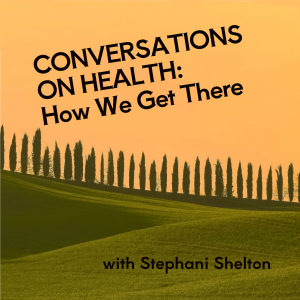
Conversations on Health: How We Get There - with Stephani Shelton
Health & Wellness Podcasts
Conversations On Health: How We Get There - with Stephani Shelton is a podcast series about health care, health care systems and the connections we need to make them better. Each podcast will explore a different aspect of health or health care. Or a different country’s health care system as it compares to ours in the US. As a veteran reporter - I want to know why so many Americans still don’t have access to the comprehensive health care so normal in other advanced countries? How are health systems dealing with higher costs and changing demographics? And if, after the disastrous response to COVID 19, the US and other nations are now prepared for another major public health crisis.
Location:
United States
Genres:
Health & Wellness Podcasts
Description:
Conversations On Health: How We Get There - with Stephani Shelton is a podcast series about health care, health care systems and the connections we need to make them better. Each podcast will explore a different aspect of health or health care. Or a different country’s health care system as it compares to ours in the US. As a veteran reporter - I want to know why so many Americans still don’t have access to the comprehensive health care so normal in other advanced countries? How are health systems dealing with higher costs and changing demographics? And if, after the disastrous response to COVID 19, the US and other nations are now prepared for another major public health crisis.
Twitter:
@stephanishelton
Language:
English
Contact:
9738383325
Episode 37: An Emergency Update Conversation with Autism Expert Amy Wetherby, PhD, Florida State University (FSU)
Duration:00:33:51
Episode 36: A Conversation with General Practitioner Bohumil Seifert, MD, PhD, Assoc. Professor, Prague, Czech Republic
Duration:00:56:08
Episode #35: A Follow-up Conversation with David Hunter, Emeritus Professor, Newcastle University on the UK’s Still Troubled NHS.
Duration:00:31:12
Episode 34: A Conversation with Autism Expert Amy Wetherby, PhD, Florida State University (FSU)
Duration:00:58:41
Episode 33: A Conversation with Dr. Anurag Gupta, Tembo Health, on Improving Dementia Care
Duration:00:45:37
Episode 32: A Conversation on Pain, Addiction and Prevention with Addiction Specialist Dr. Arun Gupta
Duration:00:50:45
Episode 31: A Conversation on How NOT to Pay Medical Bills – Legally - with Author Frank Lobb
Duration:00:44:34
Episode 30: A Conversation on Obesity with Dr. Naser E. Gharaibeh, Medical Director, Valley Health System Center for Weight and Wellness, New Jersey
Duration:00:46:24
Episode 29: A Conversation with Dr. Michelle P. Warren, Endocrinologist, Gynecologist. Medical Director, Center for Menopause, Hormonal Disorders & Women’s Health, Columbia University Medical Center
Duration:00:45:04
Episode 28: A Conversation with Ateev Mehrotra MD, MPH; Chair, Department of Health Services, Policy, and Practice, Brown University School of Public Health
Duration:00:47:20
Episode 27: A Continued Conversation with Dr. Steven D. Culler, Associate Professor of Health Policy and Management at Emory University, on Medicaid and Obamacare Updates for 2025
Duration:00:20:50
Episode 26: A Conversation with Dr. Steven D. Culler, Associate Professor of Health Policy and Management at Emory University, on Medicare Updates for 2025
Duration:00:28:19
Episode 25: A Conversation with Dr. Mirella M.N. Minkman on Neighbors Helping Neighbors Toward Better Health in the Netherlands
Duration:00:56:22
Episode 24: A Conversation with Maggie and Suzanne about Having Friends and Loved Ones in Rehabilitation and Skilled Nursing Facilities
Duration:00:32:57
Episode 23: A Conversation with Dr. Jihad Malasi, Primary Care Physician, Royal College of General Practitioners, Senior Fellow of the Faculty of Medical Leadership and Management, United Kingdom
Duration:00:53:05
Episode 22: A Conversation with Dr. Amani Hassan, Practicing Child and Adolescent Psychiatrist NHS; Faculty Chair, Child and Adolescent Psychiatry Royal College of Psychiatrists, Wales, UK
Duration:00:59:59
Episode 21: A Conversation with Theodore Lawrence, MD, PhD, Professor of Radiation Oncology, University of Michigan
Duration:00:47:32
Episode 20: A Conversation with Mohammadali Habibi, MD – an electrophysiologist with The Valley Health System in New Jersey
Duration:00:27:53
Episode 19: More of A Conversation with Catharina Barkman, Project Director, Forum for Health Policy in Stockholm on Sweden’s Universal Health Care System
Duration:00:35:36
Episode 18: A Conversation with Catharina Barkman, Project Director, Forum for Health Policy, Stockholm on Sweden’s Universal Health Care System
Duration:00:35:11